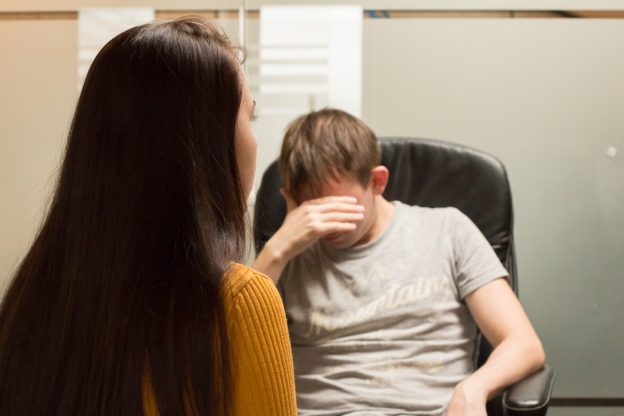
A Google search of the term “sex therapy” will immediately bring up the Healthline definition: “a type of talk therapy that’s designed to help individuals and couples address medical, psychological, personal, or interpersonal factors impacting sexual satisfaction.” However, two sex experts reveal that there is much more to the practice.
“Sex therapy is very relational,” Carolanne Marcantonio of Brooklyn Sex Therapy said. “It has a lot to do with … how we have room and space for our sometimes changing wants, needs and desires, as well as honoring where we’re at with our gender expression, sexuality and room and space for all of that, as we grow in our relationships.”
Dr. Geoff Goodman, professor in the Department of Psychiatry and Behavioral Sciences at Emory School of Medicine, is a sex and sex addiction therapist.
“What I do is work with patients who typically use sex to regulate their emotions,” Goodman said of sex addiction therapy.
Both therapists said that sex therapy is rooted in emotional factors beyond sexual behavior.
Marcantonio rejects the idea that sex therapy is one-size-fits-all. She explained that her job is based on the individuals she works with.
“Depending on what someone’s coming in for, we just provide therapy and support and give all sorts of information that help people get to where they’re going to build a better understanding of themselves,” Marcantonio said.
As a lead sex therapist of Wise Sex Therapy Associates, Marcantonio’s work is centered around nontraditional relationships, members of the LGBTQ+ community and “people in different types of relationships,” such as non-monogamous relationships.
Marcantonio said that people can seek out sex therapy for general anxiety or depression but “just like to know that they can talk about these other things if they need to,” regarding exploring their sexual practices and identities.
Goodman, who has been a licensed psychologist in New York since 1992, reflected on his decades of work as a sex therapist.
“So for sex therapy, I’m not treating the individual or the couple for sexual behavior that is out of control, that is compulsive, that they can’t stop,” Goodman said, differentiating his work as a sex therapist from his work as a sex addiction therapist.
As a sex therapist, Goodman tends to work with individuals dealing with premature ejaculation, erectile dysfunction, differences in sex drives between members of a couple and more.
What’s the difference between sex therapy and sex addiction therapy?
Goodman said that while sex therapy aims to help individuals navigate their own sexual identities, practices, traumas and preferences, sex addiction therapy is designed to help people overcome unhealthy sexual habits.
“What I do is work with patients who typically use sex to regulate their emotions and their distress and don’t have other methods for doing that emotion regulation processing that most of us do in our relationships with other people,” Goodman said.
The Mayo Clinic reports that 6% to 8% of American adults can be classified as sex addicts. However, Goodman said that many of these people are not receiving the help they need due to medical misinformation.
“There’s a group of clinicians, many of whom have ties to the porn industry, who want the public to believe that sex cannot be addictive,” Goodman said.
When people are told by medical professionals that there is no problem, they are less inclined to reach out to resources like sex addiction therapists.
Why do people seek out sex therapy?
Sex therapists encourage anyone to use therapy as a means of self-exploration and as a method of safely working through trauma.
As reported in 2021, only 5% of women and 13% of men reached out to a professional for their sexual difficulties related to the pandemic. However, Marcantonio believes that everyone can benefit from sex therapy.
“We help you build a roadmap and an understanding of who you are and help you reach the goals that you want,” Marcantonio said.
Without working through sexual traumas or traumas overall, individuals can be living with unaddressed anxieties. These can manifest within people in uncomfortable ways, triggering unhealthy behavioral responses.
“It can display in all sorts of ways,” Marcantonio said. “People can become very anxious or they might shut down, depending on how they’re wired. They might get defensive or they might kind of give what they receive.”
What societal pressures and stigmas impact how people present themselves?
Both professionals explained how the social systems people are a part of influence how comfortable they are with presenting as their most authentic selves.
Marcantonio said she has seen pressure from family, work and communities affect how people express themselves. No one is ever free from these; any society or community has its own set of norms.
Goodman explained how exposure to pornography can add pressure to people’s sex lives, identities and performances.
“I think that there are a lot of societal pressures to conform to a certain set of expectations about sex and sexual performance,” Goodman said. “And I see this in adolescents in particular, you know, adolescents are becoming increasingly exposed to more and more pornography, and in particular, more misogynistic types of porn.”
About 68% of American adolescents have been exposed to pornography. Goodman explained that this early exposure can be damaging to sexual development and behavior.
“I think that places an enormous amount of pressure on teenage boys and girls to conform to these very unrealistic standards of sexual performance, and that can cause all kinds of dysfunctions,” Goodman said.
How can people feel empowered through their sexuality in a safe and healthy way?
With anyone vulnerable to facing stigmas regarding sexuality and identity, Marcantonio and Goodman explained how the conversation around sex therapy and sexual empowerment overall must be opened up.
Goodman suggested finding reliable resources that are tailored to helping people navigate their identities and sex lives.
“Well, there are plenty of educational tools out there,” Goodman said. “You know, YouTube, for example, has plenty of educational videos about sex and sexuality.”
Marcantonio added that encouraging openness about sexuality is the first step in destigmatizing the discussion surrounding sexuality, especially for those who do not conform to societal norms.
“People tend to learn a lot from other people’s stories and examples,” Marcantonio said.











